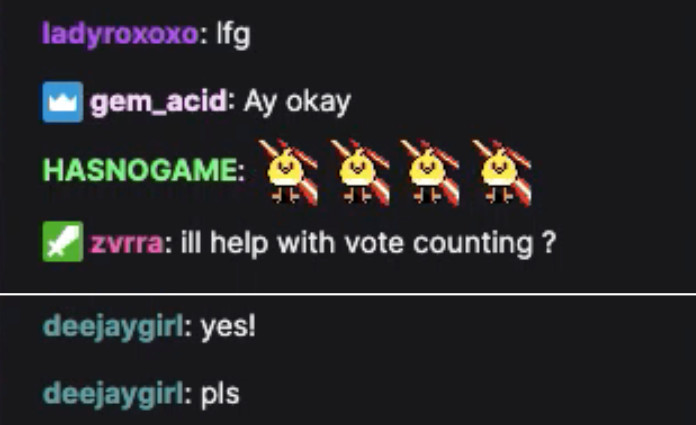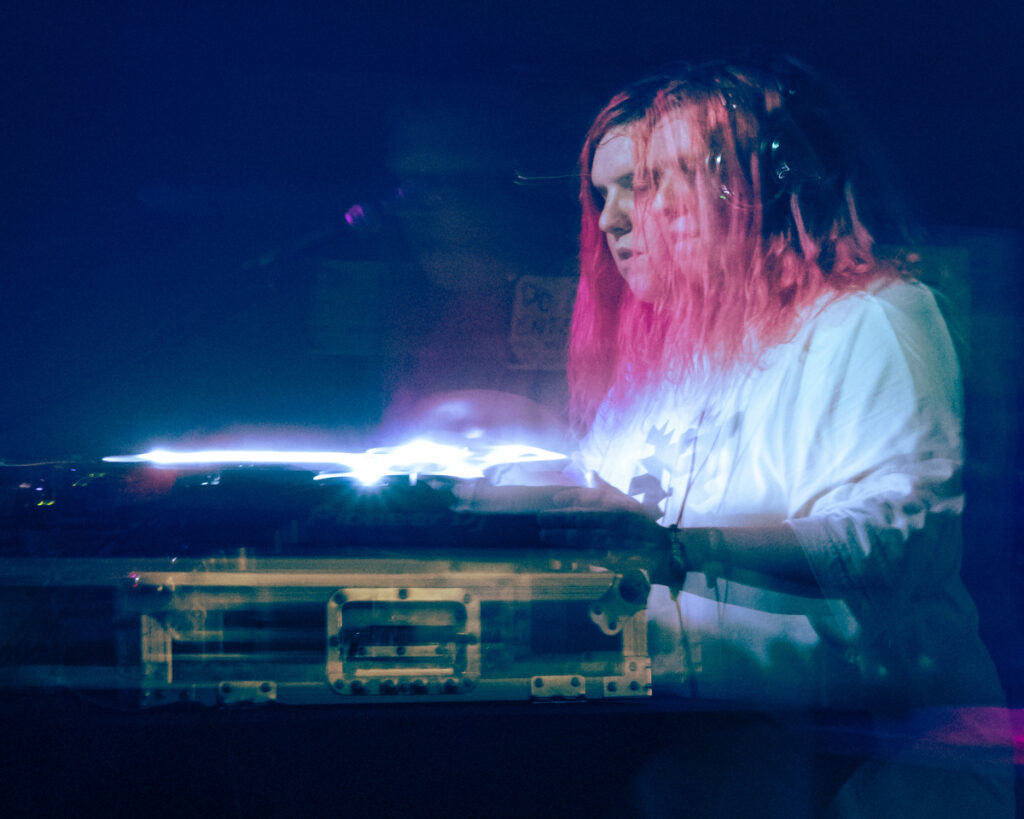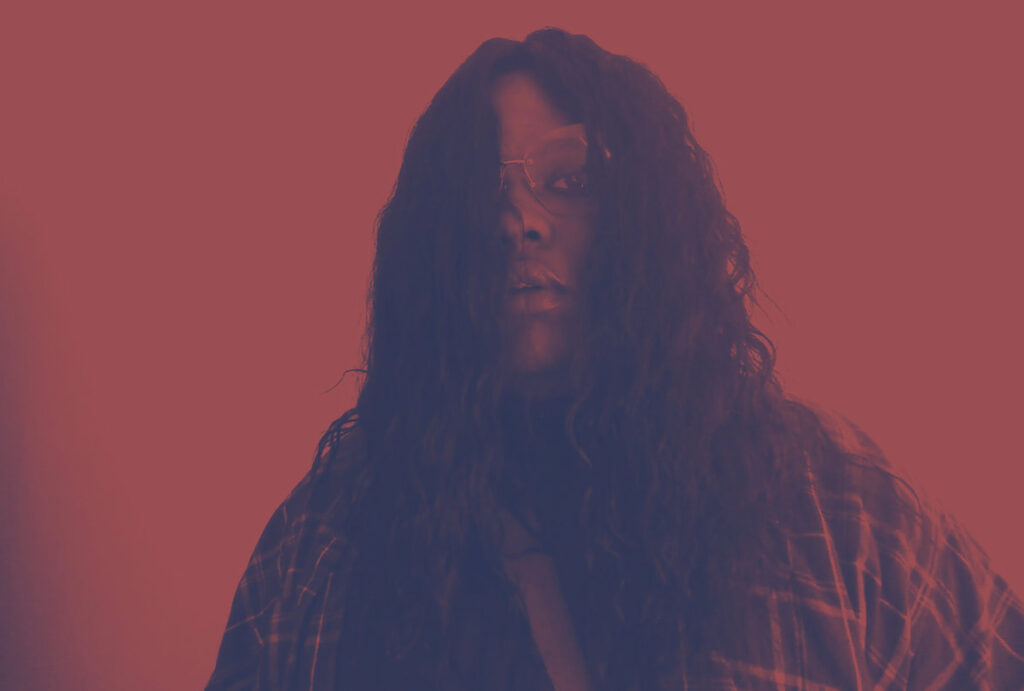EAT DIS: Sample storytelling
Creating their own virtual space to share and spur each other on creatively, DJ GIRL, Zvrra and more are pushing their own strain of hybridised club music that celebrates friendly competition and keeps the fun foregrounded. Joseph Francis dialled up the Twitch to find out more.

The Twitch chat room is livening up as a montage of Akira plays on the stream in front of me. Tetsuo’s transformation into a giant, grotesque and fleshy cyborg is overlaid with a trippy, kaleidoscope effect. Underneath, it reads VOTE: GEM I. And above, stamped in Old English font, read the words EAT DIS.

Votes like these trickle down the chat room as a glitchy electro tune soundtracks Tetsuo’s grim demise. It’s Gem’s track playing and they’re one of about a dozen from the EAT DIS label who have joined today’s livestream to listen to each other’s music. When the song finishes, host and founder of the label, Theresa Shaska (AKA DJ GIRL), shares a few words of appreciation before moving onto the next song.
This is business as usual over at EAT DIS. They call it the 2-hour Sample Pack Challenge and it takes place nearly every two weeks. Participants receive a folder of samples curated by the previous week’s winners and then have 120 minutes to make a track.
Over a video call from her place in Austin, Texas, Shaska tells me how she hadn’t set out to start a label. She had just wanted to host a series of parties in her hometown of Detroit but on the eve of the first night, she realised she didn’t have a name for the party. A friend then randomly suggested the name EAT DIS, and she ran with it. Around the same time, in 2018, she started up a Discord channel with some friends who were all making deep house music and eventually decided to compile their tracks into a release.

VIBES COMP was EAT DIS’ first record and momentum started to build after that. Shaska put out the label’s first LP, IMNI, by close friend Tatiana Triplin (AKA Yakui, AKA Nondi_, AKA Riteskeeper) who she met via Last.fm – one of the first free streaming sites. “After doing [IMNI] we were like, ‘we can make this happen,’ and then the pandemic hit,” says Shaska. “[The Discord channel] became just a good place to talk. But then we started doing these 2-hour challenges and that really brought everyone together. It would be like 17 people making the most insane tracks out of the dumbest samples.” And Shaska (who also produces under the name TCHAN) leads by example on that front. For VIBES COMP, she chopped up audio from this clip of a-guy-sucking-a-girl’s-toes-in-traffic and set it to blissful deep house music.
That sort of playful messing around with sounds drives EAT DIS’ sample pack challenges. “Footwork is a huge influence on all of us,” says Shaska. “Like really shoehorning certain samples into tracks to make them unique.” I witnessed this first hand when Raven Mazique (AKA Zvrra) – one of the earliest and most active members of EAT DIS – streamed herself on Twitch, making a track for this week’s challenge. Although the pack sadly didn’t have an audio of guy-sucking-a-girl’s-toes-in-traffic to work with, there were other treasures in there like an accapella from Rihanna’s “Cockiness” and a load of effects from Microsoft’s 3D Pinball Space Cadet.
Mazique began her two hours looping a clickety typewriter effect while rifling through the sample folders, looking for something that fit. She pulled out a 3D Pinball effect she liked and stretched it before rummaging through some more folders (including one titled “Farts”) and picking out a hi-hat, a cowbell and some string synths before deliberating over which clap to use (“The clap can really make or break a track,” she says). 40 minutes flew by, and by the end of it Mazqiue had the body of her song. What was once a blank FL Studio screen now resembled a game of Tetris – the colourful blocks betraying how she’d manipulated every sound like putty. With time to spare, she turned to the song’s intro and outro, stumbling across one of her own samples from The Legend of Zelda: Majora’s Mask along the way(“You can use samples from other packs – just so long as they’re kind of recent”).It sounded clunky at first, but after a bit of tinkering Mazique made it work, cranking her house tune into halftime so that, when the clock tower chimed, everything began to wind down.
Video games are one of Mazique’s (and many of EAT DIS’) greatest sources of inspiration. As well as being a professional DJ and producer, Mazique is a video game tester and indie video game developer. She shows me two games she’s been working on recently: one a retro first-person shooter called Dauntwood, the other a more polished-looking survival game where you explore an exoplanet and amass resources along the way. These sci-fi narratives she dreams up for her games also inform her music. “The whole time I was making Hydrogen Shore, I was thinking of a planet where it’s so hot that you can see certain molecules,” she says of a track from her recent single Hadal, “so I tried to make the music sound scary and unsettling.”
Her experimenting has gone on to influence others at EAT DIS. During one sample pack challenge, she took snippets of sounds from the popular video game Half-Life and turned them into a whole new style of music which she calls mecha. Getting any further definition of what mecha is from Mazique is tricky. The furthest she goes is to describe it as hypnotic machinery. Besides that she prefers to classify it as sound art, rather than link it to any established dance music genres. But some EAT DIS members have already used its motorik template to enrich some of their favourite styles.

“I remember Zvrra posting a little mecha snippet and I was like I need to make something as crazy as this,” says Tatiana Triplin. “I was looking for a completely new genre to get myself into and when I saw [EAT DIS] had made a channel for it on Discord, I was like, this is exactly the sort of thing I’ve been looking for.” Triplin has embraced the style through both her Nondi_ and Riteskeeper projects. “PLEASE STOP KILLING ME” from Riteskeeper I is a souped-up footwork track with an incessant pummelling of drums punctuated by sinuous whirrings and crumbling textures, like a Transformer clawing through concrete. Another mecha disciple is Robin Richardson (AKA twofold). Their take on it isn’t as oppressive as Triplin’s but it still packs a punch. “Twirly Twister (I Like That)” from their Twice Twixt EP, for example, moves at a steadier pace than Triplin’s footwork interpretation, with vocal bursts and industrial effects bouncing around the track in a similar way to how Jersey Club producers use bed squeaks and gun click samples. “It’s so versatile,” says Richardson. “In the time that we’ve been playing with the sound, there’s been a big range of ideas from drone and deep techno and schranz to juke.”
Mecha has rejuvenated both Richardson and Triplin’s music. Although Triplin’s recent Flood City Trax for Planet Mu has little evidence of mecha, if you were to look at her most recent releases, however, you’d spot the mecha tag near the bottom of every Nondi_ track and hear a touch of something lo-fi and mechanical in all of them. The same can be said of Richardson, whose transition from producing as D.Richardson to twofold coincides with their adoption of the style, and their self-released debut LP Black Armor is almost entirely based around Mazique’s creation. In that album, Richardson uses mecha’s extreme and abrasive template to explore vulnerability and racial prejudice. “I’m using mecha to say, ‘I want to protect you,’” they say. “I want to look out for my community the same way they look out for me.”
The enthusiasm and support within EAT DIS is palpable. There are subtle things, like how on Bandcamp you’ll see thumbnails from those in the collective under each of their friends’ releases. They don’t miss a beat. And then there are the more obvious moments, like during the sample pack challenges when everyone heaps on praise for their friends’ work (“So good I love the attention to those breaks”/ “it’s the bit reduction on ‘em that does it for me” / “love those epiano chords slowly lifting out through the track”).
Initially it felt like the voting was a little arbitrary, but then I saw what happened when something really landed. Votes modestly trickled in as Lamar’s track opened with sharp breaks loosely scattered amongst a soulful “love you so” vocal and some teasing 3D Pinball effects. The breaks then dissipated, leaving the vocal free to glide up and down the pitch range before returning with a renewed militancy, driving doggedly forwards over a throbbing bassline.

In seconds the mood had gone from vague and pensive to rowdy and ready for a knees-up – and we were all there to experience it together. It reminded me of the sort of collective listening you did back at school, splitting earphones on the bus or blaring a fresh CD out of your stereo for the first time.

Lamar won this week’s challenge but, such was the range of ideas and ways people interpreted the sample pack, it wouldn’t be right to focus on just one tune. Secat’s garage-inflected ghettotech track was the one that made the best use of the Rihanna acapella, looping Riri’s “you come around” vocal through lightly glowing synths and a sumptuous guitar lick, before then letting the lyrics unravel over bopping kick drums. LadyRoxoxo’s strutting trip hop number was more subdued in comparison but refreshing because of it, allowing the “love you so” sample to plod over muted breaks, laser pulses and gated synths.
“I don’t want it to be known as my label,” says Shaska. “A lot of labels tend to be vanity projects as opposed to a more communal thing. Some of the earlier netlabels from the 2000s were more like that but you don’t really see it anymore. It’s more about pushing content.” The all caps on every release, the album descriptions which remind you to eat your vegetables and the Good Charlotte-style logo give EAT DIS the feel of a high school student’s doodle-ridden exercise book – messy at first glance but fun and bursting with ideas on closer inspection.
Shaska has a more pithy analogy for it though. “EAT DIS is like a katamari,” she laughs. In that game (Katamari Damacy) you roll up clumps of earthly bric-a-brac until it’s big enough to become a star. From its modest beginnings with a deep house compilation, EAT DIS has rolled from sample pack challenge to sample pack challenge creating bright bundles of music out of nothing but odds and sods. “Doing the label has been a learning process for all of us: It’s an as-a-group-we’re-all-getting-better session.” says Shaska. “That’s definitely something that makes it worth it – we learn and get better together.”
//
Joseph has kindly put together a BuyMusicClub selection of his best picks from the EAT DIS catalogue – give it a check and support the music!